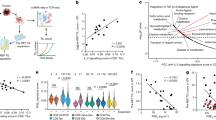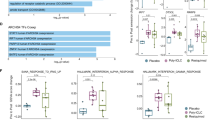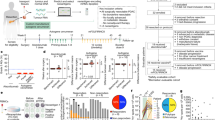Abstract
Certain autonomous parvoviruses preferentially replicate in and kill in vitro-transformed cells and may reduce the incidence of spontaneous and implanted tumors in animals. Hence, these viruses and their derivatives are currently under evaluation as antitumor vectors. However, the mechanisms underlying their tumor-suppressing properties are not yet understood. We asked whether the lytic parvovirus H1 may enhance the immunogenicity of infected tumor cells. Out of human melanoma and gastrointestinal tumor cells, we selected the cell line SK29-Mel-1 being very susceptible to H1-induced apoptotic killing. Here, no upregulation of HLA class I and costimulatory molecules could be observed following H1 infection. However, a strong release of the immunogenic signal—the inducible heat-shock protein HSP72, but not constitutive HSP73—was observed after H1 infection. The HSP72 release was higher and of longer duration than a conventional heat-shock treatment. We also explored H1 replication and cytotoxicity in human immune cells, as such cells may constitute targets for H1 virus replication. Long-term cultured lymphocytes, monocytes, immature and mature dendritic cells were not susceptible to H1 virus. Altogether, parvovirus-mediated cell killing may in vivo enhance tumor immunogenicity by HSP72 release and thus contribute to the antitumor effect of parvoviruses.
This is a preview of subscription content, access via your institution
Access options
Subscribe to this journal
Receive 12 print issues and online access
$259.00 per year
only $21.58 per issue
Buy this article
- Purchase on Springer Link
- Instant access to full article PDF
Prices may be subject to local taxes which are calculated during checkout

Similar content being viewed by others
Abbreviations
- MVM:
-
minute-virus of mice
- MOI:
-
multiplicity of infection
- PFU:
-
plaque-forming unit
- Wt:
-
wild-type
- p.i.:
-
post infection
- RLU:
-
relative light units
- MHC:
-
major histocompatibility complex
- HLA:
-
human leucocyte antigen
- HSP:
-
heat-shock proteins
- HSP73:
-
constitutive expressed heat-shock protein 70
- EBV:
-
Epstein-Barr virus
- APC:
-
antigen-presenting cells; PBMC, peripheral blood mononuclear cells; CTL, cytotoxic T lymphocytes; DC, dendritic cells
References
Kirn D, Martuza RL, Zwiebel J . Replication-selective virotherapy for cancer: biological principles, risk management and future directions. Nat Med. 2001;7:781–787.
Van den Eynde BJ, van der Bruggen P . T cell defined tumor antigens. Curr Opin Immunol. 1997;9:684–693.
Fields RC, Shimizu K, Mule JJ . Murine dendritic cells pulsed with whole tumor lysates mediate potent antitumor immune responses in vitro and in vivo. Proc Natl Acad Sci USA. 1998;95:9482–9487.
Belli F, Testori A, Rivoltini L, et al. Vaccination of metastatic melanoma patients with autologous tumor-derived heat shock protein gp96-peptide complexes: clinical and immunologic findings. J Clin Oncol. 2002;20:4169–4180.
Bethke K, Staib F, Distler M, et al. Different efficiency of heat shock proteins (HSP) to activate human monocytes and dendritic cells: superiority of HSP60. J Immunol. 2002;169:6141–6148.
Melcher A, Todryk S, Hardwick N, Ford M, Jacobson M, Vile RG . Tumor immunogenicity is determined by the mechanism of cell death via induction of heat shock protein expression. Nat Med. 1998;4:581–587.
Srivastava P . Roles of heat-shock proteins in innate and adaptive immunity. Nat Rev Immunol. 2002;2:185–194.
Moehler M, Blechacz B, Weiskopf N, et al. Effective infection, apoptotic cell killing and gene transfer of human hepatoma cells but not primary hepatocytes by parvovirus H1 and derived vectors. Cancer Gene Ther. 2001;8:158–167.
Rommelaere J, Cornelis JJ . Autonomous Parvoviruses. In: Hernaiz Driever P, Rabkin SD, eds. Replication-Competent Viruses for Cancer Therapy. Basel: Karger; 2001;22:100–129.
McKisic MD, Paturzo FX, Smith AL . Mouse parvovirus infection potentiates rejection of tumor allografts and modulates T cell effector functions. Transplantation. 1996;61:292–299.
Acknowledgements
The work was granted through a fellowship to MM by the University of Mainz (MAIFOR program). The work at the DKFZ was supported by the EU (QLK3-CT-2001-01010).
Author information
Authors and Affiliations
Corresponding author
Rights and permissions
About this article
Cite this article
Moehler, M., Zeidler, M., Schede, J. et al. Oncolytic parvovirus H1 induces release of heat-shock protein HSP72 in susceptible human tumor cells but may not affect primary immune cells. Cancer Gene Ther 10, 477–480 (2003). https://doi.org/10.1038/sj.cgt.7700591
Received:
Published:
Issue Date:
DOI: https://doi.org/10.1038/sj.cgt.7700591



